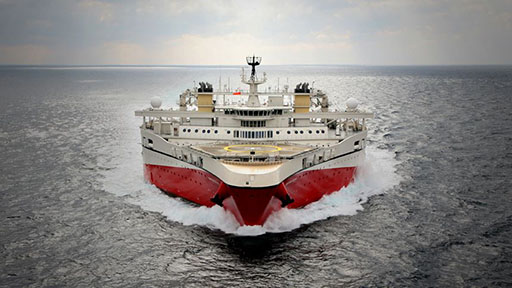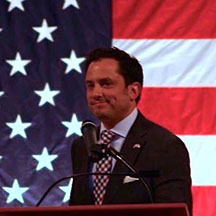The US government has called on Venezuela to respect Guyana’s sovereignty and says it is monitoring developments here after Georgetown complained of an incursion by the Venezuelan Navy into this country’s waters on Saturday. Caracas, meanwhile, has called for direct dialogue with Guyana.
“We are monitoring reports that the Venezuelan Navy may have interfered with vessels operating on behalf of ExxonMobil. We underscore that Guyana has the sovereign right to explore and exploit resources in its territorial waters and Exclusive Economic Zone,” Robert Palladino, the US State Department’s Deputy Spokesperson said on Twitter yesterday.
“We call on #Venezuela to respect international law and the sovereignty of its neighbors,” he added.

The Government of Guyana on Saturday said that it will be formally writing to the Venezuelan Government and the United Nations about the “illegal, aggressive and hostile act” perpetrated by the Venezuelan Navy which intercepted a research vessel subcontracted by ExxonMobil to work in Guyana’s territory earlier that day. ExxonMobil has since paused all seismic activities on the Stabroek Block where it has made major oil discoveries, and the ship, the Ramform Tethys, which was undertaking seismic acquisition, has left the area. The Guyana Government has emphasised that the vessel was in Guyana’s waters.
Meanwhile, in a statement yesterday, Venezuela’s Ministry of Foreign Affairs called for the reestablishment of direct dialogue with Guyana. It claimed that two seismic exploration vessels, the Bahamian-flagged Ramform Tethys, and Trinidad-flagged Delta Monarch, were in Venezuelan waters.
According to the statement, the National Bolivarian Navy, while carrying out its customary patrolling in the Venezuelan Atlantic front by the Oceanic Patrol vessel Kariña, spotted the “unprecedented presence in Venezuelan jurisdictional waters” of the two seismic exploration vessels. It said that the ships were located at the coordinates of Latitude 09° 17′ 4″N Longitude 058°15′ 7″ W and Latitude 09° 15′ 0″ Longitude 058° 17′ 3″W, in the maritime projection of the Orinoco Delta. The Ministry claimed that this was “undoubtedly within Venezuelan sovereignty.”
“In face of this flagrant violation of sovereignty, the corresponding international protocols for this type of events were applied and national sovereignty was safeguarded with strict adherence to the international agreements and treaties,” the statement said.
It said that during a communications exchange with the exploration vessels’ captains, they argued that they held a permit from Guyana to operate in the maritime space in question. “They were informed that the referred country did not have jurisdiction over the maritime projection of the Orinoco Delta, which caused them to (cease) their work and navigate towards the waters of the extensive zone projected by the Essequibo coast,” the statement said.
It noted that the Venezuela Government has informed the Secretary General of the United Nations and sent a protest note to the Government of Guyana “in face of this unacceptable violation of national sovereignty, which above the territorial controversy over the Guayana Esequiba, has trespassed all limits with this unprecedented incursion, pretending to make use of maritime spaces belonging to the Orinoco Delta projection of undoubted Venezuelan sovereignty.”
The Ministry called for dialogue on the matter. “The Government of the Bolivarian Republic of Venezuela, based on the Bolivarian diplomacy of peace, wishes to reiterate to the Cooperative Republic of Guiana (sic) a call for the reestablishment of direct and respectful dialogue over this sensitive matter,” the statement said.
“At the same time, it guarantees its firm determination to defend the territorial sovereignty of the Republic and the interests of the Venezuelan people based on the most scrupulous respect for International Law,” it added.
Well within
Guyana has said that the ship was well within its territory, with the Ramform Tethys being intercepted at approximately 140 km from the nearest point on the provisional equidistant line with Venezuela. On Saturday, Minister of Foreign Affairs Carl Greenidge had emphasised that Guyana rejects the illegal, aggressive and hostile act perpetrated by the Venezuelan government which he said once again demonstrates the real threat to Guyana’s economic development posed by its western neighbour.
The Ministry, he noted, will be bringing this latest act of illegality and blatant disrespect, “an Act which violates sovereignty and territorial integrity of our border” to the attention of the United Nations. It is also in the process of informing the seven governments of the 70 crew members of the threat to their safety and issuing a formal communication to the Venezuelan government.
ExxonMobil has said that all seismic activities on the Stabroek Block have been paused until they can be safely continued. The company, which has so far discovered 10 viable prospects for oil extraction, indicated that 3-D seismic data acquisition of the western portion of the Stabroek Block began this month. The company has so far announced the estimated recoverable resource for the Stabroek Block at more than five billion oil-equivalent barrels.
Saturday’s action was reminiscent of the 2013 interception of Anadarko’s exploration of the Roraima Block in the ultra-deep-water offshore Guyana.
The US petroleum company had its programme of exploration for offshore Guyana for 2013 abruptly halted on October 10, when a corvette from the Venezuelan Navy intercepted the seismic exploring vessel, MV Teknik Perdana and directed it to steam towards the Venezuelan island of Margarita. The MV Teknik Perdana was indirectly under contract with Anadarko to explore the Roraima Block with a view to determining whether commercial quantities of hydrocarbon existed.
After the release of the vessel by Venezuela, talks between the foreign ministers of Guyana and Venezuela resulted in a decision to have the countries’ technical experts meet in four months to discuss maritime delimitation. They also reiterated that dialogue and cooperation were the means for a peaceful solution of differences between States. These talks were never held as Venezuela provided a list of excuses leaving Takuba Lodge with the view that there was never any intention to have any type of talks which could permit Anadarko to resume its work.
Since then Guyana has applied to the International Court of Justice (ICJ) to have the matter of the border controversy with Venezuela definitively settled.
After decades of the Good Offices process under UN auspices failed to resolve the border controversy, Guyana on March 29th, 2018, filed an application with the ICJ requesting that it confirm the legal validity and binding effect of the 1899 arbitral award settling the boundaries between British Guiana and Venezuela.
As a result of Guyana’s application on March 29th, the ICJ in early June announced that it would receive the Representatives of Venezuela and of Guyana on June 18th, 2018, in order to know the points of view of the parties regarding procedural issues in Georgetown’s move for a juridical settlement of the controversy.
It was at this meeting that Venezuela advised the ICJ that it would not be taking part in the process and did not recognise the court’s jurisdiction.
The Court therefore pointed out that in the circumstances of the case, it must first settle the question of its jurisdiction and that “this question should accordingly be separately determined before any proceedings on the merits” of the matter filed by Guyana.
Consequently, as of November 19, Guyana has submitted its memorial pertaining to the question of whether the court has jurisdiction to adjudicate over a juridical settlement of the long-running border controversy between the two countries.






